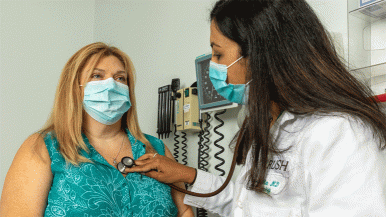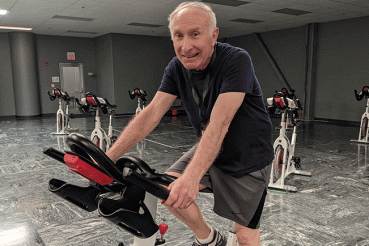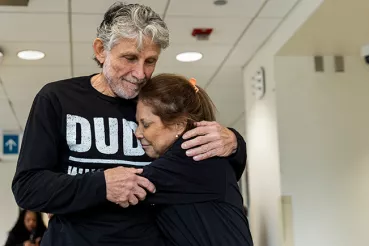Neesie Lampman is a heart attack survivor who enjoys going for a daily walk and looks forward to beginning cardiac rehab.
After delaying a trip to the emergency department, she almost didn’t have the chance.
Lampman, 52, began feeling ill one evening, with a headache, nausea and tightness in her back. She figured it was indigestion. Her symptoms continued and worsened until, on the fifth day, she went to RUSH University Medical Center’s Emergency Department.
It turns out, she was having a heart attack.
“I kept saying ‘I don’t think it’s my heart. It’s not my heart. It’s just my blood sugar,’ ” says Lampman, who has diabetes and a family history of heart disease. “I didn’t want to go to the hospital. I was scared of COVID-19.”
Lampman wasn’t alone in her worries; and her symptoms, which didn’t match the most typical chest and arm pain associated with heart attack, only added to her indecision.
Across the globe, hospitals are reporting a significant drop in emergency heart attack calls during the pandemic, with some patients citing their fear of COVID-19. The American Heart Association, which reported a 25% drop in 911 heart attack calls, is urging Americans to immediately take action when they suspect heart attack or stroke.
Symptoms may be less obvious, but just as serious
Even without a pandemic, women like Neesie Lampman often delay emergency heart care, fearing they are over-reacting to their symptoms, which often are more subtle than men’s. But delaying treatment can lead to serious heart damage or even death.
“You don’t want to be figuring this out at home,” said cardiologist Anupama Rao, MD. “You need blood work, EKGs and a physical exam.”
At her mother’s urging, Lampman considered going to the emergency room, but she pictured the crowded hospitals in New York and Europe. “I thought, ‘What if I sit next to someone with COVID and I bring that home?’” she says, adding her mother and son would be at risk of serious COVID-19 complications.
Adding to her hesitation, she didn’t have the classic symptom of gripping chest pain — sometimes described as “an elephant sitting on your chest” — and her blood sugar was high, which can mimic heart symptoms. She brought her sugar levels down and felt better — for a short time, until her back pain had reached up her neck and into her jaw, too.
“Then I got a tingling in my shoulders and top of my chest. It was not pain really. And I broke into a cold sweat,” Lampman said. After a sleepless night, she asked her mother to take her to RUSH on Tuesday morning.
No reason to fear hospital, no time to worry
“When I walked into RUSH, it was nothing like the images of hospitals that we saw on TV. There were not wall-to-wall patients in the emergency room, no patients in the hallway,” Lampman says, adding that she was never near another patient, and the COVID-19 patients were in an entirely different area.
“People are dying because they think it’s not safe to come to the hospital. Let’s start talking about that and maybe save a life,” she says. “I really wish I had gone to the hospital on Saturday instead of waiting until Tuesday morning.”
Lampman didn’t know it at the time, but she was having the most serious type of heart attack, a segment elevation myocardial infarction (STEMI). As soon as she arrived at the RUSH emergency room, she had blood tests and an electrocardiogram. She was then quickly taken to the cardiac catheterization lab for an angioplasty to open and place stents in four arteries.
“She’s extremely fortunate. This condition is very time sensitive,” says Rao, who treated Lampman when she came in.
Ideally, the goal is to be able to open a blocked artery no more than 90 minutes after symptoms first appear. But people who experience atypical symptoms — including women and people with diabetes — are less likely to seek care right away and, as a result, less likely to receive treatment during that timeframe. And atypical symptoms can include extreme fatigue or weakness, nausea and a sudden cold sweat.
“Hyperglycemia (high blood sugar) makes you feel pretty lousy, so it can be hard to recognize other symptoms,” says a RUSH expert. “It may not feel severe enough to come in. For any symptoms that are new to you, whether it’s chest pain or just feeling really uncomfortable, you need to be seen immediately, especially if you have other medical issues.”
In a column published by Better.com titled, “Women Heart Patients Aren’t Seeking Help During COVID-19 — A Cardiologist Sounds the Alarm,” cardiologist and director of the RUSH Heart Center for Women Annabelle Volgman, MD, urges people to call 911 when they are having symptoms of heart attack — and not to worry about COVID-19 or about calling about atypical symptoms.
“I always tell patients that it’s better to be safe than sorry, and get your symptoms checked out,” Volgman says. “Time is essential to saving heart muscle, so the artery causing the heart attack must be opened as immediately as possible. It’s the delay in calling for help that makes many heart attacks fatal.
Neesie Lampman is grateful to have a second chance. She hopes others will learn from her experience and not delay seeking care for heart attack symptoms. “I really shouldn’t be here,” she says. “I am so lucky to be alive.”
Heart attack symptoms
Call 911 right away if you experience any of the following:
- Chest discomfort. Most heart attacks involve discomfort in the center of the chest that lasts more than a few minutes, or that goes away and comes back. It can feel like uncomfortable pressure, squeezing, fullness or pain.
- Discomfort in other areas of the upper body. Symptoms can include pain or discomfort in one or both arms, the back, neck, jaw or stomach.
- Shortness of breath with or without chest discomfort.
- Other symptoms, including breaking out in a cold sweat, nausea or lightheadedness.
Source: American Heart Association




